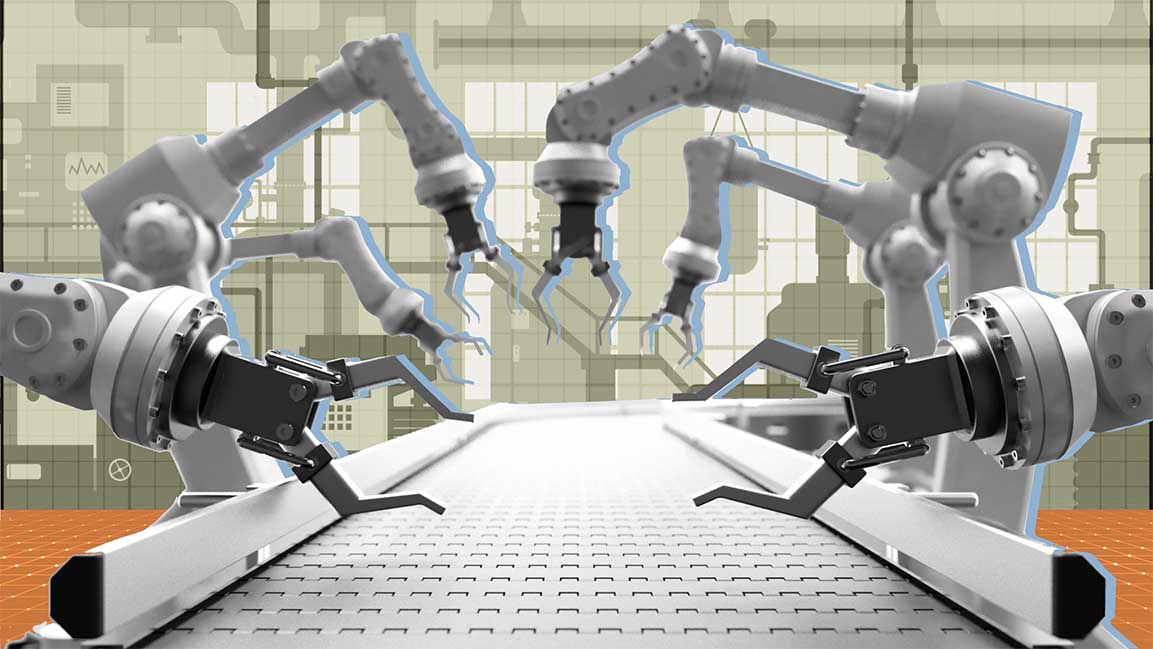- | 9:00 am
Is automation a key business transformation strategy in the Middle East?
From business outcomes to sustainability, automation offers a path to achieving goals for organizations to create better work environments, say experts.

What the economic historian Aaron Benanav calls the “automation discourse” has been going on for decades, with many skeptics breathlessly predicting the automation software would soon be applied to everything, conjuring fears of robots taking over.
The reality is automation can accelerate human achievement, with people doing work they love and businesses thriving.
One can see, then, how the spread of mechanization to all branches of industry has multiple favorable effects: more people employed, producing more and varied goods for reduced effort.
The economic argument is straightforward: Higher productivity implies faster economic growth, more consumer spending, increased labor demand, and thus greater job creation.
SUSTAINING BUSINESS PERFORMANCE
Now, with consequences of the pandemic, ongoing trade concerns, and geo-political uncertainties disrupting business operations—creating supply shortages, and making demand forecasting and customer engagements more complex, Raj Mistry, Executive Vice President, Europe, and the Middle East Region, Automation Anywhere, says, automation has become “a foundational technology” to overcome these obstacles.
“As world tensions increase, business leaders across the Middle East indicate that automation has become a pivotal business transformation strategy to navigate current market challenges and sustain business performance.”
“We’re seeing things we never thought we would experience in our lifetime, and that’s forcing companies to rapidly adapt and understand how to remain agile for unexpected events and scale their automaton strategies amid ongoing disruptions,” Mistry adds.
According to a recent report, factory automation will be one of the top trends in Saudi Arabia and the UAE in 2023, as they focus on the Fourth Industrial Revolution, also called Industry 4.0.
Nearly 4000 factories in Saudi Arabia will rely on automated equipment and technologies to raise efficiency. Recently, the country launched The Future Factories Program to build a robust tech ecosystem to transform the manufacturing sector in the country.
“Advanced manufacturing and AI-based technologies are no longer a luxury or a choice but have become inevitable to ensure growth and profitability,” said Bandar Alkhorayef, Minister of Industry and Mineral Resources in Saudi Arabia, adding that the industrial growth strategy is centered on employing AI and emerging technologies.
AI technologies are being applied within the ministry to offer insight and help decision-making procedures. “We believe there’s a huge opportunity to transform, and we invite all technology companies, consulting firms, and service providers to join this effort,” he added.
Reinventing business using automation technologies is gaining steam across the Middle East region. The UAE is focusing on increasing productivity and innovating products using automated systems over the next 50 years. Even the companies in Qatar, like Qatar Insurance Company, are using automation for operational efficiency.
“Automation ensures that businesses can keep moving 24/7 when a core system is down, or workforces are unavailable,” said Ayman AlQudsi, Chief Information Officer at United Arab Bank. “By automating banking processes, we are enabling teams to offload repetitive tasks, helping every employee increase productivity so they can spend more time innovating, building relationships, and driving business growth.”
However, a Deloitte study shows that only 13% of companies have been able to scale their automation efforts, often struggling to customize one-size-fits-none automation tools and on-premise platforms.
Automation improves productivity, but the degree to which this is enhanced can vary greatly depending on the approach and effort taken during the automation’s planning, design, and implementation. “The simplest approach would be to automate highly repetitive and mundane tasks, as this allows users to focus on more high-value initiatives,” says Dinesh Varadharajan, Chief Product Officer at Kissflow.
“Going further, businesses can look to automate more complex processes and leverage automation to collect and correlate data from multiple stakeholders. This then not only enhances productivity but begins to drive business outcomes. An organization should also recognize the value of an iterative approach to automation as the tracing and optimizing automated processes can further enhance efficiency,” he adds.
Automation reaps the greatest rewards when integrated with broader business or operational transformation goals. If implemented within silos, automation initiatives will be minimal, or might even fail because of their inability to scale as the business grows, says Varadharajan.
Experts say the workforce would have greater freedom in working hours and patterns when automated devices control factory operations. These include robotic process automation and cognitive automation tools deploying AI. These new technologies can automate more manual work and give organizations resources to support effective collaboration and governance.
SECURITY, INCREASING BUDGET
Automation is perhaps a step toward getting regional security strategies up to global standards. A Delinea study shows that automation is a crucial part of cybersecurity, as 50% of respondents said they used it to integrate privileged access management, and 29% are planning more automation in the next 12 to 18 months.
In a region with security skills gaps, many say, organizations with a team to keep a safe environment should not burden them with humdrum duties. These teams will add much greater value as dedicated threat hunters and risk managers.
Automation is expected to add an estimated $15 trillion benefit to the global economy by 2030, according to Gartner. No wonder then that automation budgets are dramatically increasing. “Nearly 80% of organizations indicate they will boost their automation budgets in the year ahead and expect to have 500 or more bots deployed within 12 months,” says Mistry.
According to a recent Automation Anywhere study, a quarter of respondents say they are escalating automation funding by at least 25% to help speed up automation deployments.
With automation proving to be core to business operations, the report also indicates that 77% of respondents said they’d made automation a priority for the next 12 months, having achieved an average return on investment of 6.3 times; 94% of respondents stated automation is helping address supply chain issues, and 61% of respondents strongly agree that automation has helped address staffing shortages.
FUTURE OF AUTOMATION
The future of automation is cloud and cloud-based automation. “It’s a huge opportunity for organizations because they are integral for future-proofing business transformation strategies,” says Mistry. “Cloud delivers agility and flexibility to rapidly respond to the nature of today’s quickly evolving environments, which rings true for the more than 80% of our customers who have already adopted a cloud-first approach for all new automation initiatives.”
According to various reports, productivity improvement is the most commonly cited benefit of automation, followed by moving the workforce to higher-value work. “Managers are much more supportive of the technology, acknowledging that automation addresses the business mandates they face today: to cut costs, improve operational efficiencies, and boost innovation,” says Mistry
“One challenge is that more executive support is needed. Additional executive-level support and vision is the top need to accelerate the deployment of intelligent automation solutions and overcome a lack of understanding of the value of automation within individual business units and teams,” he adds.
IMPACT OF AUTOMATION ON WORKERS
What will be the impact of automation on workers in the region?
Automating manual, repetitive business processes provides knowledge workers with the leverage and scale their businesses need to grow and thrive. “Through automation, employees can build a digital workforce that’s always on and works alongside them, freeing workers to focus on adding value and providing better products and customer experiences,” says Mistry.
According to Varadharajan, incorporating automation, including automation training, could help organizations attract new and retain existing talent. “Since the pandemic, greater emphasis has been placed on employee health and wellbeing. Changes to workforce dynamics, increased working hours, and pressures from the overall economic climate have made employee burnout a major concern for organizations. While there is no doubt that many factors contribute to burnout, the time spent on mundane, repetitive tasks is certainly a major factor. By eliminating this, automation allows employees to find greater meaning in their work.”
To be successful in the digital era of work we now operate in, businesses need individuals with technical skill sets that can enable overall digital transformation objectives.
“Organizations that offer the ability to upskill, especially in critical technology areas, will stand to attract and retain top talent,” he adds. “Workforce that can contribute to the digitalization roadmap by leveraging their expertise in a particular line of business -– be it sales, HR, operations, or marketing — and their newly learned skills in developing automation workflows, made possible by convenient drag and drop interfaces, will stand to have a clear advantage in the global talent pool.”
Leveraging technologies such as low-code/no-code to eliminate the technical barriers to digitalization enable business users to create applications that automate processes and digitalize operations actively. “Automation also helps streamline processes. While each might individually only deliver incremental enhancements in efficiencies when scaled across the entire enterprise, they rapidly add up and can translate to significant reductions in the resources – human, energy, and others – that are consumed,” says Varadharajan.
Simply put, automation makes it easier for everyone to build developer skills and contribute to the digital world. Experts say the democratization of automation helps people find meaningful career paths.
“This feeling of fulfillment comes from a sense of control, and the democratization of automation enables employees and business users to take ownership of the digital advancement of their organizations,” says Varadharajan.
AUTOMATION AND SUSTAINABILITY
But the potential of automation is even greater. It can also solve some of the most pressing issues plaguing the region, especially for organizations focused on reducing their carbon footprint. “When considering the balance between the growing digital appetite, and the alignment of this goal with broader sustainability objectives in the region, it is important to recognize that digitalization itself can pave the way for more green operations,” says Varadharajan.
“Automation enables businesses to evolve to a paperless work environment and help drive efficiencies that translate to tangible reductions in an organization’s carbon footprint owing to the ability to operate with fewer resources, eliminate time and energy expended on repetitive tasks, and reduce human errors that would otherwise draw on resources.
By improving business outcomes and sustainability —on top of creating better employee experiences—enterprise automation truly is the secret to delivering positive change in the region.








































